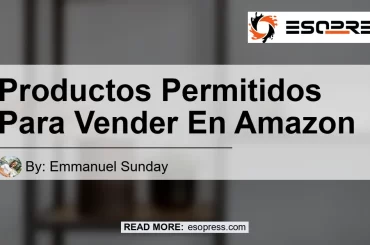

In the age of e-commerce, Amazon has become a dominant player in the retail industry. With its vast marketplace and convenient shopping experience, many consumers rely on Amazon for their purchasing needs.
But what happens if something goes wrong? Can you sue Amazon for any grievances or damages that may occur?
In this article, we will delve into the topic of suing Amazon and shed light on the possibilities and limitations involved. So, can you really sue Amazon?
Let’s find out.
Check out this Youtube video: “FTC, 17 states sue Amazon over allegations it inflates online…” to learn more about the legal implications of “can I sue Amazon” and how it affects online shopping.
Contents
- 1 Understanding Small Claims Lawsuits Against Amazon
- 2 Third-Party Sellers and Limitations on Lawsuits
- 3 Workplace Injuries and Employer Liability
- 4 The Monopoly Power Lawsuit Against Amazon
- 5 Conclusion: Exploring Your Legal Options
- 6 Best Product Recommendation: Amazon Basics USB-C Cable
- 7 Frequently Asked Questions
Understanding Small Claims Lawsuits Against Amazon
One of the most common reasons people consider suing Amazon is for issues related to the delivery of purchased items. For example, if Amazon fails to deliver the items you ordered, you may feel frustrated and seek legal remedies.
In such cases, small claims lawsuits can come into play.
In the United States, small claims courts handle civil cases involving low-dollar amounts, typically ranging from a few thousand dollars up to $10,000. These courts offer a simplified, expedited process that allows individuals to resolve their disputes without the need for expensive and time-consuming litigation.
If the value of your claim falls within the small claims limit in your jurisdiction, you can indeed sue Amazon for failure to deliver the items you purchased. However, it’s important to note that the small claims limit may vary from state to state.
Some states may have higher limits, such as $20,000, while others may have lower limits.
Keep in mind that the small claims process is designed for individuals, not businesses. If you are a third-party seller on Amazon, you may have agreed to certain terms and conditions that limit your ability to sue Amazon directly.
We will explore this further in the next section.
Third-Party Sellers and Limitations on Lawsuits
If you are a third-party seller on Amazon’s marketplace, your ability to sue Amazon directly for damages may be limited. When you sign up as a seller on Amazon, you typically agree to the terms and conditions set by the company.
These terms may include clauses that require disputes to be resolved through arbitration or mediation, rather than traditional legal proceedings.
Arbitration is a process where an impartial third party reviews the dispute and makes a binding decision. Mediation, on the other hand, involves a neutral mediator who helps the parties reach a mutually agreeable resolution.
These alternative dispute resolution methods can be faster and more cost-effective than going to court, but they may limit your ability to pursue a lawsuit against Amazon.
It’s essential to carefully read and understand the terms and conditions when becoming an Amazon seller. If you have any concerns about your rights or limitations, it may be wise to seek legal advice before entering into any agreements.
Workplace Injuries and Employer Liability
Another situation where the question of suing Amazon may arise is in cases of workplace injuries. If you are an employee of Amazon and you suffer an injury while on the job, you may wonder whether you can sue the company for damages.
The answer to this question depends on various factors, including the specific circumstances of the injury and the applicable workers’ compensation laws in your jurisdiction. In many cases, workers’ compensation laws provide a no-fault system that allows employees to receive compensation for medical expenses and lost wages without having to prove employer negligence.
However, there may be exceptions to the workers’ compensation system that allow employees to sue their employers in certain situations. These exceptions typically apply when the employer’s actions or omissions go beyond typical workplace hazards or when intentional harm is involved.
If you believe your injury falls into one of these exceptions, it is crucial to consult with an attorney who specializes in employment law to understand your options.
The Monopoly Power Lawsuit Against Amazon
While individual cases of suing Amazon may be limited, there have been notable instances where Amazon faced legal action on a larger scale. One such example is the lawsuit brought forward by the Federal Trade Commission (FTC) and several state attorneys general alleging that Amazon has illegally maintained monopoly power in the online retail and technology space.
The lawsuit accuses Amazon of engaging in anticompetitive practices that stifle competition and harm both consumers and third-party sellers. The outcome of this lawsuit could have significant implications for the future of Amazon and its business practices.
Conclusion: Exploring Your Legal Options
In conclusion, the question of whether you can sue Amazon depends on various factors, including the nature of your claim, the terms and conditions you agreed to as an Amazon seller, and the specific circumstances of the case. While small claims lawsuits may be a viable option for consumers seeking compensation for delivery issues, third-party sellers may be subject to limitations outlined in their agreements with Amazon.
If you are an Amazon employee who suffered a workplace injury, workers’ compensation laws and potential exceptions to those laws may come into play. Speaking with a qualified attorney who specializes in employment law can help clarify your rights and options in such cases.
It is important to consult with legal professionals to understand the specific laws and regulations governing your jurisdiction and unique circumstances. This article serves as a starting point to provide general information but should not be considered legal advice.
Now, let’s move on to the best product recommendation related to the topic of “can I sue Amazon.”
Best Product Recommendation: Amazon Basics USB-C Cable
One recommended product that stands out in the Amazon ecosystem is the Amazon Basics USB-C Cable. This high-quality cable offers reliable charging and data transfer capabilities for various devices. With its durable construction and compatibility with a range of USB-C enabled devices, it provides a seamless charging experience.
To check out the Amazon Basics USB-C Cable and make a purchase, follow this link to the product on Amazon.


In conclusion, while the possibility of suing Amazon may be limited for individuals in certain situations, it is crucial to understand the specific terms, conditions, and laws that govern such actions. Consulting with legal professionals is always advisable when considering legal action. And don’t forget to consider the Amazon Basics USB-C Cable for your charging needs.
Remember, the information provided in this article is for informational purposes only and should not be taken as legal advice.






